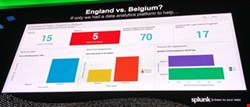Demands on companies to answer questions are being better resolved with the use of telemetry data.
Speaking at the Splunk Live conference in London, Splunk’s head of marketing Matt Davies said that the company is “turning data into answers” and “thinking about how traditional data works with reputational databases and reference points.”
He asked the audience if they were listening to the machine data, which is “always talking to us” and typically comes from the apps and websites commonly used. He cited airline apps and websites, saying “we expect services and apps to meet our needs, it is secure, and do it when I want.”
Davies acknowledged that machine data is messy, processed in real time and has fluctuations in patterns, and often it is the case that there is a lot of data and teams do not what they want from the data.
“Splunk is about making machine data accessible and readable, how you use it and what to do with it if you get access to it, and what is the value from IT to security or business to marketing and to people in the field,” he said. “It is shared via a dashboard to ask questions in real time, as you do not want to make decisions on data that is a day or week old, and you want to make sure that the data is relevant.”
In terms of security, Davies pointed at the acquisition earlier this year of Phantom Cybersecurity and how Splunk is moving further into the cybersecurity space, by “helping make sure your data is protected and you’re compliant.”

Davies also used his presentation to show how he was able to predict the result of the evening’s World Cup game between England and Belgium by using telemetry data, looking at FIFA rankings, goal differences from previous matches and the 1966 World Cup win, which led him to predict that England will win 2-1.
